Book reviews play a crucial role in guiding readers’ purchasing decisions by influencing their perceptions of a book’s quality. By leveraging insights from various sources such as online platforms, specialized blogs, and social media influencers, readers can make informed choices about their next read. Crafting effective reviews requires a thoughtful analysis of the book’s content and style, ultimately helping potential readers determine if the book aligns with their interests.
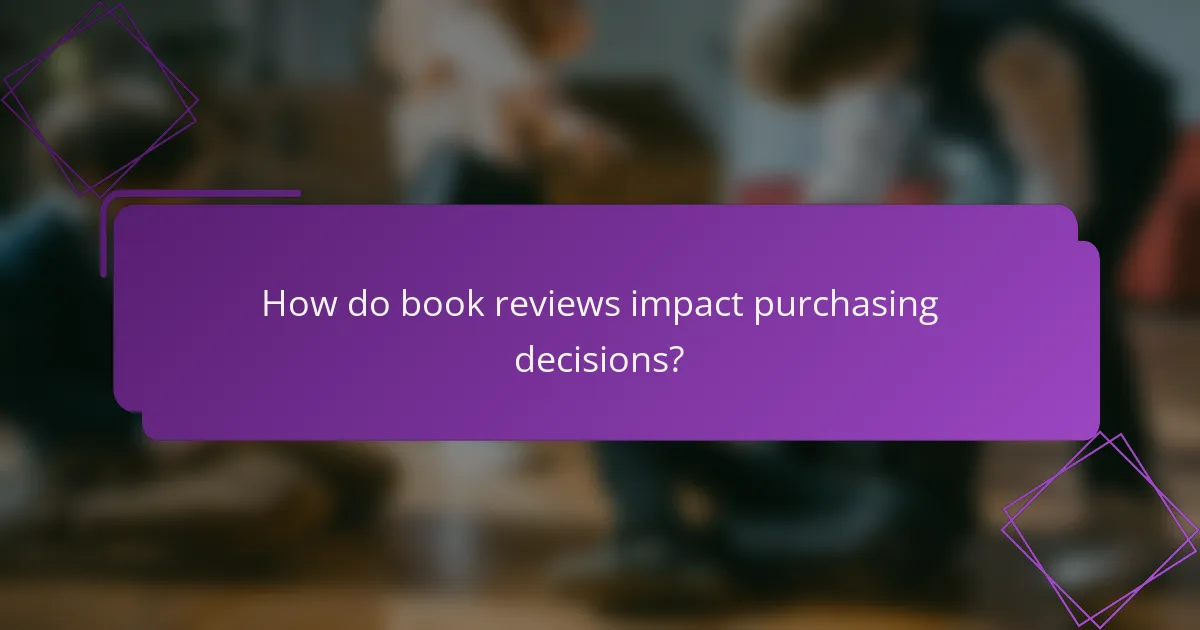
How do book reviews impact purchasing decisions?
Book reviews significantly influence purchasing decisions by shaping consumer perceptions and providing insights into a book’s quality. Positive reviews can lead to increased sales, while negative feedback may deter potential buyers.
Influence of ratings on sales
Ratings play a crucial role in driving book sales. Generally, books with higher ratings, often above four stars, tend to sell better than those with lower ratings. Consumers frequently rely on these ratings as a quick reference to gauge a book’s overall quality.
For example, a book rated 4.5 stars or higher on platforms like Amazon or Goodreads can see sales increase by a significant percentage, sometimes in the range of 20-50%. This highlights the importance of aiming for high ratings to boost visibility and sales.
Role of reviews in consumer trust
Reviews contribute to building consumer trust by providing authentic feedback from other readers. When potential buyers see detailed reviews, they feel more confident in their purchasing decisions, especially if the reviews highlight specific aspects of the book, such as character development or plot quality.
Trust is further enhanced when reviews come from verified purchasers or reputable sources. A mix of positive and constructive reviews can also lend credibility, as consumers perceive them as more balanced and trustworthy.
Effect on author visibility
Book reviews can significantly enhance an author’s visibility in a crowded market. Authors with numerous positive reviews are more likely to be featured in promotional materials or recommended lists, increasing their reach to new readers.
Moreover, platforms like Amazon often use algorithms that favor books with higher review counts and ratings in search results. This means that authors should actively encourage readers to leave reviews to improve their chances of being discovered by a wider audience.
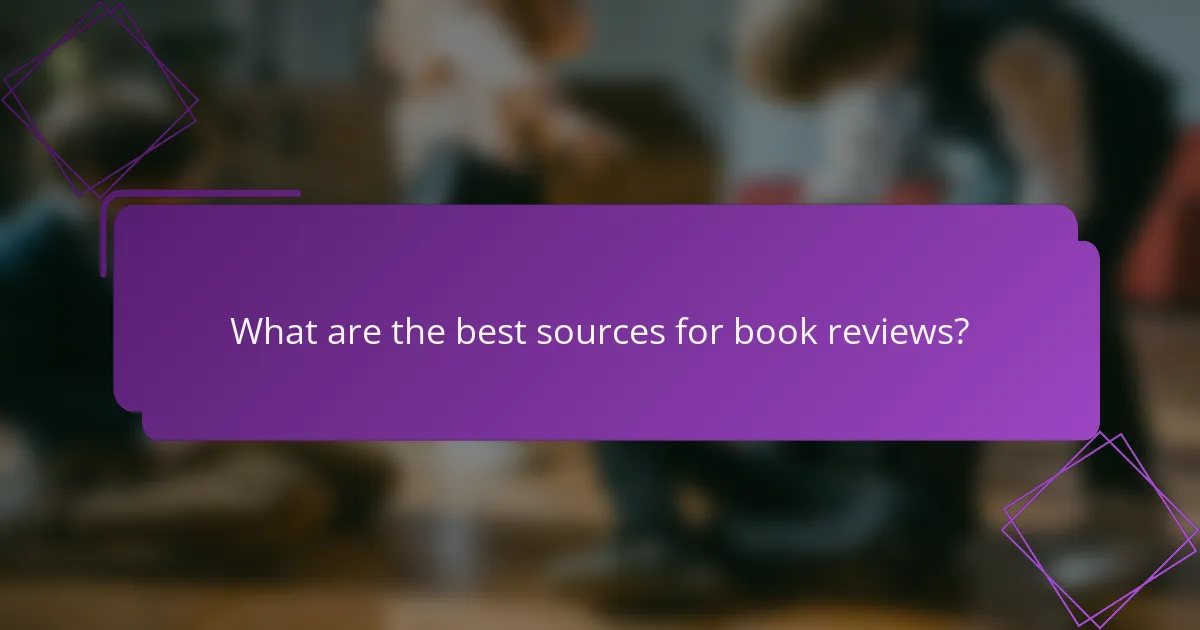
What are the best sources for book reviews?
The best sources for book reviews include online platforms, specialized blogs, and social media influencers. Each source offers unique insights and perspectives that can help readers make informed decisions about their next read.
Online platforms like Goodreads
Goodreads is one of the most popular online platforms for book reviews, allowing users to rate and review millions of titles. With a vast community of readers, it provides a diverse range of opinions, making it easier to gauge a book’s reception.
When using Goodreads, consider checking the average rating and reading a mix of both positive and negative reviews to get a balanced view. The platform also offers personalized recommendations based on your reading history.
Book blogs and literary websites
Book blogs and literary websites often feature in-depth reviews, author interviews, and thematic discussions. These sources can provide critical analysis and context that may not be available in user-generated reviews.
Look for blogs that align with your reading preferences, whether they focus on specific genres or literary criticism. Many blogs also host giveaways or offer exclusive content, enhancing the reading experience.
Social media influencers
Social media influencers, particularly on platforms like Instagram and TikTok, have become significant sources for book recommendations. Their engaging content often includes quick reviews, unboxings, and reading challenges that can inspire your next book choice.
When following influencers, pay attention to their reading tastes and styles to ensure they align with yours. Engaging with their content can also lead to discovering new authors and trends in the literary world.
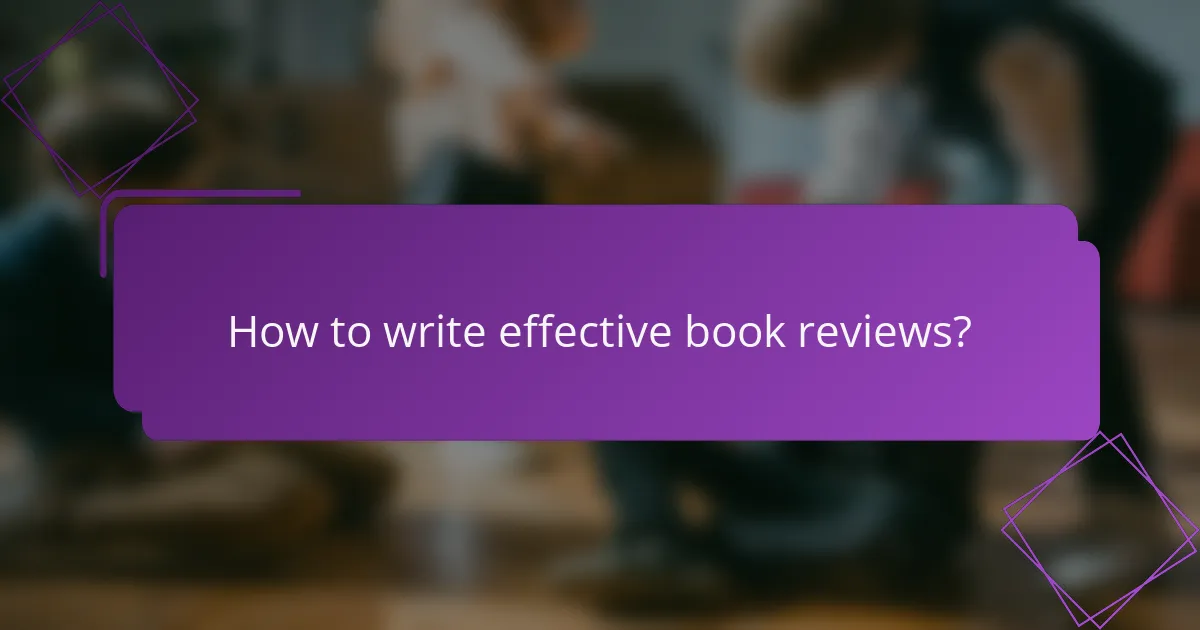
How to write effective book reviews?
Writing effective book reviews involves providing a thoughtful analysis of the book’s content, style, and impact. A well-crafted review should engage readers and help them decide whether the book aligns with their interests.
Key elements of a compelling review
A compelling book review should include a brief summary of the plot or main ideas, an evaluation of the writing style, and insights into the themes presented. Highlighting the strengths and weaknesses of the book can also provide valuable context for potential readers.
Consider including your personal reflections on how the book resonated with you. This subjective element can make your review more relatable and engaging for others.
Structuring your review for clarity
Start with an engaging introduction that captures the reader’s attention and provides essential information about the book, such as the title, author, and genre. Follow this with a concise summary of the content, ensuring not to reveal any spoilers.
Organize the body of your review into clear sections, addressing different aspects such as character development, pacing, and thematic depth. A logical flow helps readers follow your analysis and understand your perspective.
Using quotes and examples
Incorporating quotes from the book can strengthen your review by illustrating your points and providing evidence for your opinions. Choose impactful passages that highlight key themes or character insights.
Additionally, using specific examples from the text can clarify your arguments and make your review more persuasive. Aim to balance quotes with your own commentary to maintain your voice throughout the review.
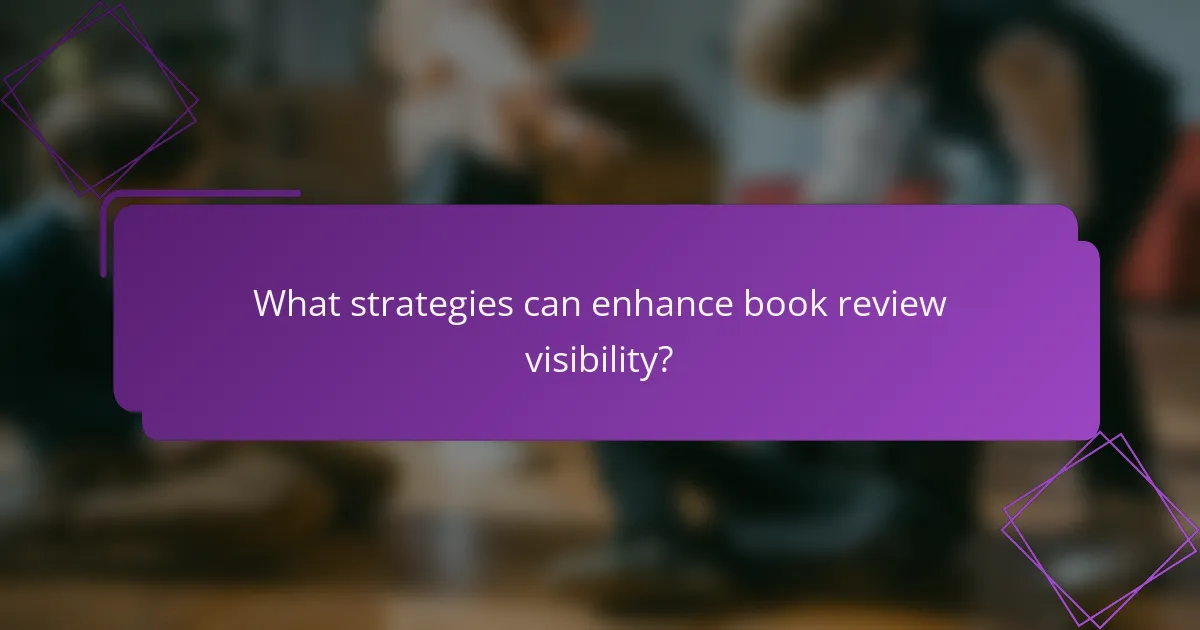
What strategies can enhance book review visibility?
Enhancing the visibility of book reviews involves employing effective strategies that attract more readers and engagement. Key approaches include optimizing for search engines, utilizing social media platforms, and actively participating in the reading community.
SEO techniques for book reviews
Search Engine Optimization (SEO) techniques are crucial for increasing the visibility of book reviews online. Start by using relevant keywords related to the book’s title, author, and genre throughout your review. This helps search engines index your content effectively.
Additionally, consider optimizing meta descriptions and using alt text for images. Aim for a keyword density of around 1-2% to avoid keyword stuffing, which can negatively impact your ranking. Internal linking to other related reviews can also enhance SEO performance.
Leveraging social media for promotion
Social media platforms are powerful tools for promoting book reviews. Share your reviews on platforms like Facebook, Twitter, and Instagram, using relevant hashtags to reach a broader audience. Engaging visuals, such as book covers or quotes, can attract more attention.
Consider joining book-related groups or forums where you can share your reviews and connect with fellow readers. Regularly posting and interacting with your audience can build a loyal following, increasing the chances of your reviews being shared further.
Engaging with the reading community
Engaging with the reading community is essential for boosting the visibility of your book reviews. Participate in book clubs, online forums, and author events to network with other readers and writers. This can lead to increased exposure for your reviews.
Commenting on other book blogs or reviews can also create reciprocal relationships, where others may return the favor by promoting your work. Consider hosting giveaways or collaborating with other reviewers to expand your reach and foster a sense of community.
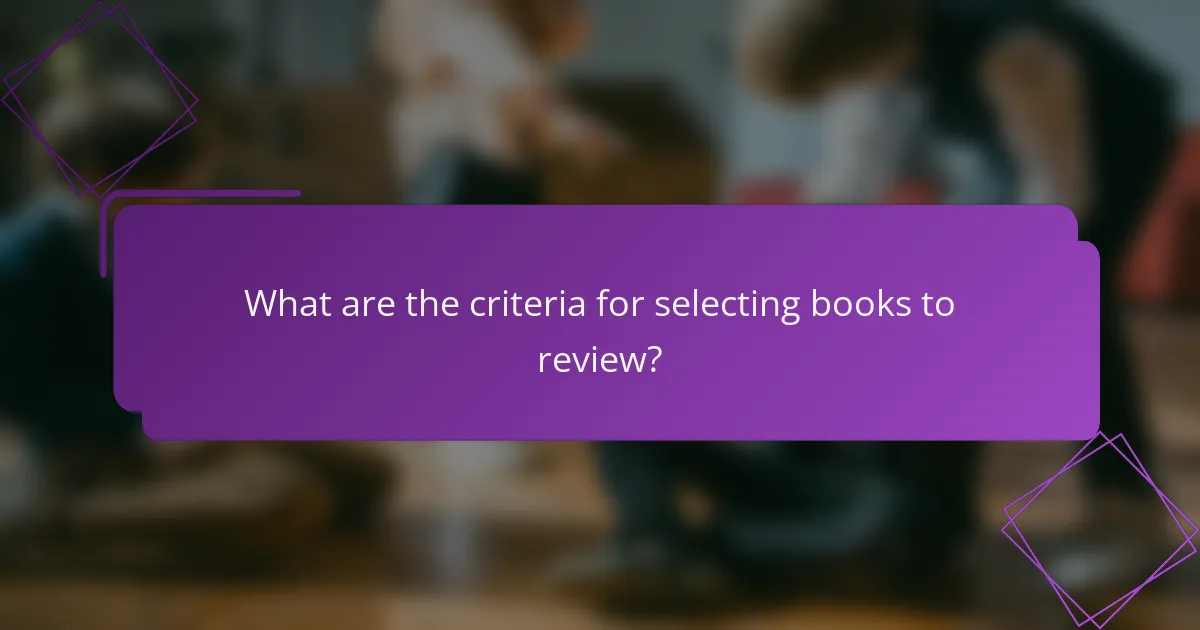
What are the criteria for selecting books to review?
Selecting books to review involves considering factors such as audience interests, genre relevance, and current literary trends. A thoughtful approach ensures that the reviews resonate with readers and provide valuable insights.
Identifying target audience preferences
Understanding the target audience’s preferences is crucial for selecting books to review. Consider demographics such as age, gender, and reading habits to tailor your choices effectively. Engaging with readers through surveys or social media can provide direct insights into their interests.
For example, if your audience consists mainly of young adults, focusing on contemporary fiction or popular young adult novels may yield better engagement. Additionally, tracking reader reviews and ratings on platforms like Goodreads can help identify what resonates with your audience.
Evaluating book genres and trends
Evaluating book genres and current trends is essential for selecting relevant titles. Stay informed about popular genres, such as thrillers, romance, or non-fiction, and how they evolve over time. Following literary awards and bestseller lists can provide insights into what is currently capturing readers’ attention.
Consider the seasonal trends as well; for instance, holiday-themed books may be more appealing during the winter months. A balanced mix of classic and contemporary titles can also attract a broader audience, ensuring diverse content in your reviews.
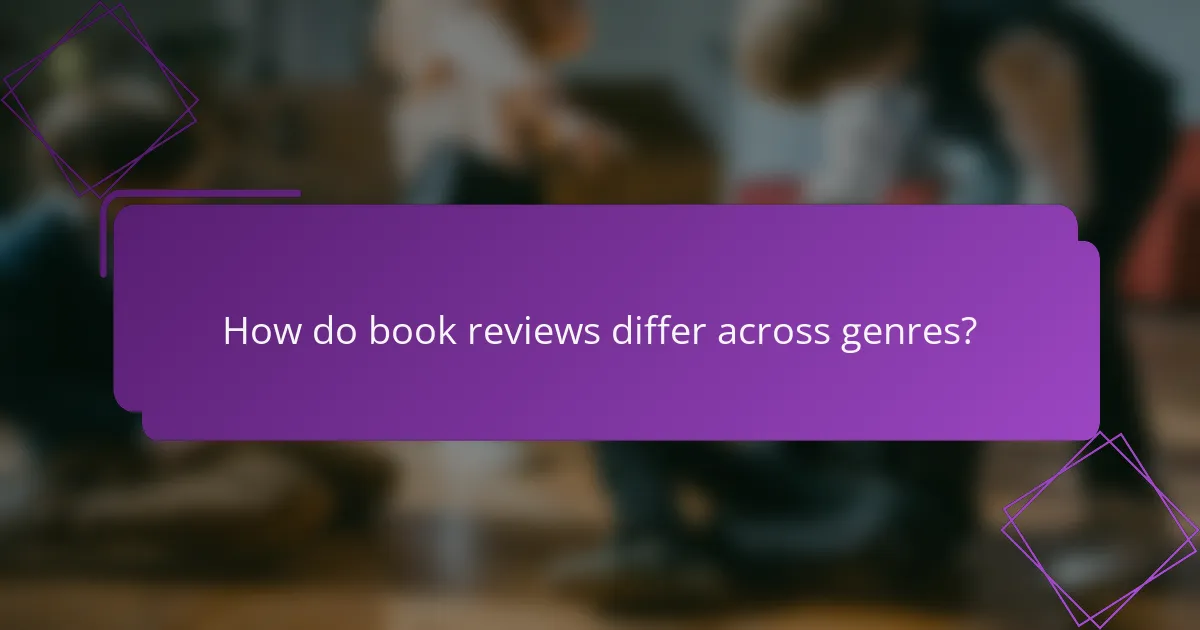
How do book reviews differ across genres?
Book reviews vary significantly across genres, reflecting the distinct characteristics and expectations of each category. Fiction reviews often focus on narrative style and character development, while non-fiction reviews emphasize factual accuracy and the author’s expertise.
Comparative analysis of fiction vs. non-fiction reviews
Fiction reviews typically assess elements like plot structure, character arcs, and emotional impact. Reviewers may look for originality in storytelling and the depth of themes presented. In contrast, non-fiction reviews prioritize the clarity of arguments, the reliability of sources, and the relevance of the content to current issues.
For example, a fiction review might highlight how well a novel captures the human experience, while a non-fiction review would evaluate how effectively a book communicates its thesis and supports it with evidence. This distinction influences the language and criteria used in each type of review.
Genre-specific review expectations
Each genre has its own set of expectations that reviewers should consider. In romance, for instance, readers often seek emotional connection and character chemistry, while in thriller genres, pacing and suspense are paramount. Understanding these nuances helps reviewers tailor their critiques effectively.
Additionally, genre conventions can dictate the structure of reviews. For example, a science fiction review might delve into world-building and speculative elements, whereas a memoir review would focus on personal narrative and authenticity. Being aware of these expectations can enhance the quality and relevance of a book review.
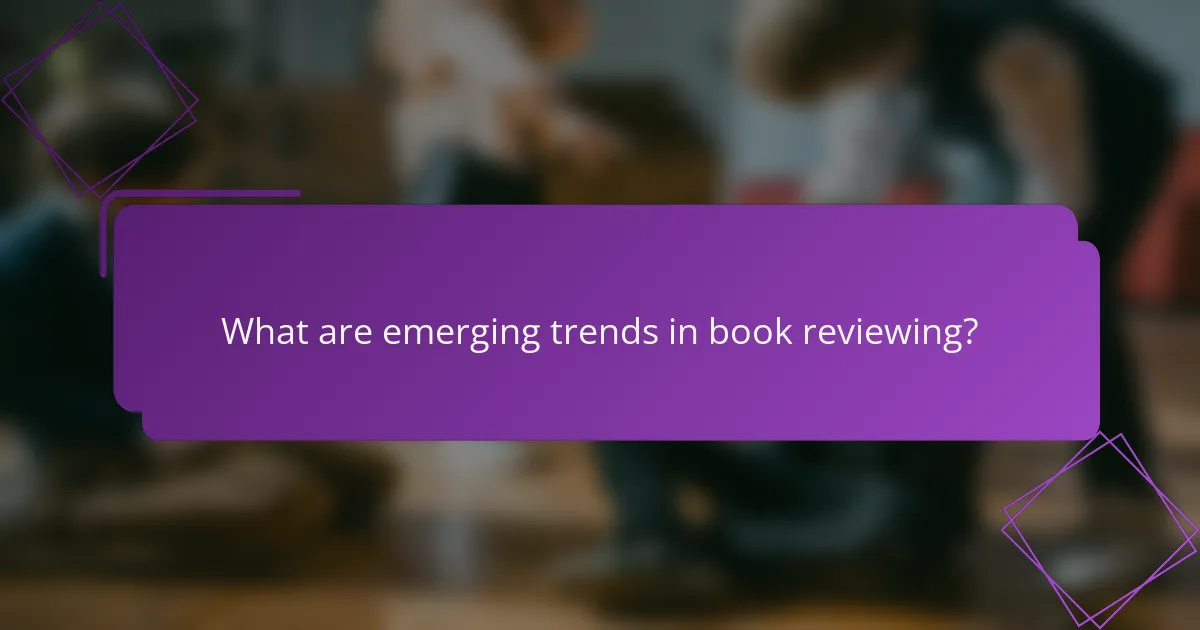
What are emerging trends in book reviewing?
Emerging trends in book reviewing include the rise of multimedia content, particularly video reviews, and the increasing influence of social media platforms. These trends are reshaping how readers discover and engage with books, making reviews more accessible and interactive.
Impact of video reviews on engagement
Video reviews significantly enhance engagement by allowing reviewers to convey emotions and nuances that text alone may miss. Viewers often prefer visual content, leading to higher retention rates and interaction levels compared to traditional written reviews.
Platforms like YouTube and TikTok have become popular venues for book reviews, where creators can showcase their personalities and connect with audiences. This format encourages community interaction through comments and shares, further amplifying the reach of the reviews.
To effectively use video reviews, focus on clear visuals and concise messaging. Aim for a duration of 5-10 minutes to maintain viewer attention, and consider including a call-to-action, such as asking viewers to comment on their thoughts about the book. Avoid overly lengthy videos that may lose viewer interest.



